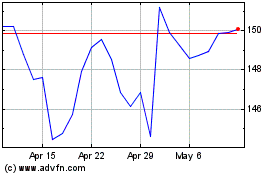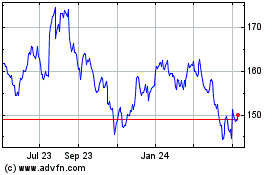By Peter Loftus and Joseph Walker
Drugmakers are reconfiguring manufacturing plants and hiring
hundreds of new workers to be ready to make coronavirus drugs and
vaccines should they prove in testing to be effective in fighting
off the virus.
Johnson & Johnson, Pfizer Inc. and other companies are
gearing up so they can make hundreds of millions of doses of
coronavirus pills and shots as quickly as possible if studies
support their worth.
For some companies, the efforts involve shifting production of
existing drugs to other factories, rejiggering supply chains and
even partnering with rivals.
Companies, which typically only make enough doses of
developmental drugs for studies, don't usually start readying for
full-scale production this early. This manufacturing ramp-up,
however, is part of the industry's speedy mobilization to deal with
the pandemic even as companies lose out on tens of millions of
dollars in manufacturing investments if their drug and vaccine
candidates fail during testing.
Regeneron Pharmaceuticals Inc. plans to shift production of
eye-disease treatment Eylea and other drugs to facilities in
Ireland to devote its Rensselaer, N.Y., plant to making a Covid-19
drug.
"By the end of the summer, I'd like our plant to be completely
operational to produce large quantities" of a coronavirus drug,
Regeneron Chief Executive Leonard Schleifer said in an interview,
"and not far behind that, to have other companies using our
technology to make sure we can supply as many people as
possible."
There is no approved treatment or vaccine for Covid-19, the
disease caused by the virus. Drugmakers and public-health officials
are hoping a drug to treat symptoms of the disease could clear
testing and be greenlighted for widespread use within months, and a
vaccine by early 2021.
To be ready to make large volumes of the products, companies
must begin preparing their plants now. They need to secure supply
chains for key ingredients -- sometimes from other countries --
install new equipment, and find contract manufacturers who can
help.
Gilead Sciences Inc. began ramping up manufacturing of its
experimental antiviral drug remdesivir in January, when researchers
began exploring its use against Covid-19. As of late March, the
drugmaker had produced more than 30,000 treatment courses.
Gilead aims to have produced 140,000 treatment courses for
Covid-19 patients by the end of May, and more than one million by
the end of December, though the company is still waiting for the
results of testing.
In a pandemic, "you can't wait to start making your investment
in the manufacturing until you're sure you have a product," said
Bruce Gellin, president of global immunization at the Sabin Vaccine
Institute, which promotes vaccine adoption and trains immunization
professionals.
Preparing manufacturing plants to make a new vaccine can cost
anywhere from $50 million to $700 million, according to a 2017
paper in the medical journal Vaccine.
To reduce the risk of squandering the investment, pharmaceutical
companies typically wait until a drug or vaccine is in the advanced
stages of testing, and looks like it will succeed in the studies,
before starting to make it in large quantities.
But the unpredictable nature of pandemics has wound up costing
drugmakers in previous outbreaks of viruses like Ebola, which
subsided before drugs finished testing and companies could start
selling them.
Drugmakers would likely have a big market for products that are
successful in clinical trials, but profits may be limited because
some companies have said they'll sell on a not-for-profit basis at
affordable prices.
Now, governments and nonprofits are trying to help companies
reduce their financial risks, and companies are putting their hands
out for financial assistance.
"We cannot produce all of this and not know if there's going to
be a market or not, or if it is going to work or not," said David
Loew, who leads Sanofi SA's vaccine business, one of the world's
biggest.
He said Sanofi is talking with governments and nonprofits about
getting financial help to pay for making hundreds of millions of
doses of its coronavirus vaccine candidate.
The Bill and Melinda Gates Foundation said last week it plans to
work with governments and other organizations to help finance the
expansion of vaccine production to expedite a global supply once
clinical trial results are available.
The U.S. Biomedical Advanced Research and Development Authority
recently agreed to give Moderna Inc. up to $483 million partly to
pay for scaling up capabilities to make the biotech's coronavirus
vaccine candidate, one of the most advanced.
The new federal funding will help the company develop processes
for large-scale manufacturing of tens of millions of doses a month
next year, Chief Executive Stephane Bancel said.
Moderna, which has about 850 employees, plans to hire another
150 by the end of the year to help with the manufacturing ramp-up,
Mr. Bancel said. The company will expand manufacturing to three
shifts a day, seven days a week, from two daily shifts each
weekday.
J&J aims to make more than one billion doses of its
experimental vaccine, Chief Scientific Officer Paul Stoffels said.
It will start making the shots soon at a plant in Leiden, the
Netherlands, which has been making experimental vaccines for other
diseases.
The company plans to produce the vaccine at plants in the U.S.,
Dr. Stoffels said, and is talking with contract manufacturers that
could make it in Europe and Asia.
Pfizer aims to begin testing four vaccine candidates in
development with Germany's BioNTech SE by the end of this month.
Pfizer has been buying raw materials to make the vaccines and plans
to tap manufacturing plants that make sterile injectable products
or vaccines such as its pneumococcal vaccine Prevnar 13, said Mike
McDermott, the company's global-supply president.
Yet a single plant doesn't have capacity to make hundreds of
millions of doses by the end of the year, so Pfizer is assembling a
network of facilities across the globe that will contribute
different steps in the process, Mr. McDermott said.
Pfizer will also hire more workers, he said, and may shift
production of existing products to its own facilities or have
contract manufacturers temporarily make them to free up
capacity.
Jared S. Hopkins and Denise Roland contributed to this
article.
Write to Peter Loftus at peter.loftus@wsj.com and Joseph Walker
at joseph.walker@wsj.com
(END) Dow Jones Newswires
April 23, 2020 08:14 ET (12:14 GMT)
Copyright (c) 2020 Dow Jones & Company, Inc.
Johnson and Johnson (NYSE:JNJ)
Historical Stock Chart
From Aug 2024 to Sep 2024

Johnson and Johnson (NYSE:JNJ)
Historical Stock Chart
From Sep 2023 to Sep 2024
